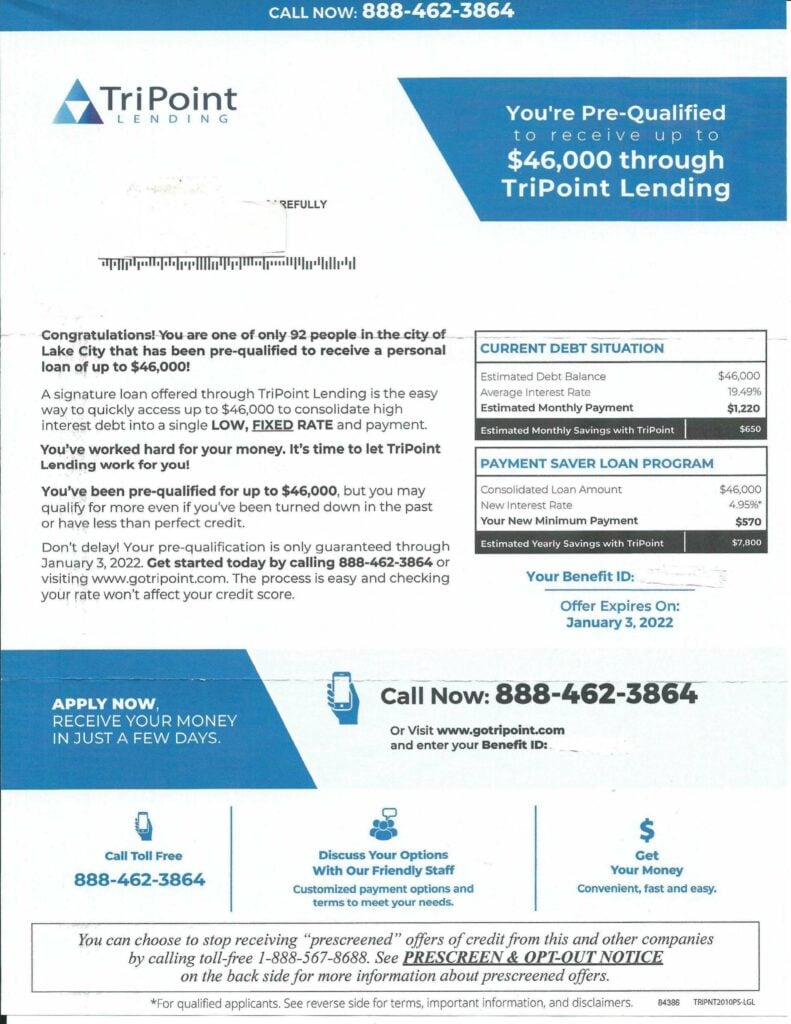Alleviate Financial, LLC, dba TriPoint Lending is a marketing lead generator and is a Duly Licensed California Finance lender. They offer personal loans and debt consolidation loans. And they advertise their services through Tripointlending.com and Alleviatefinancial.com
Review Summary
Can we trust Tripoint Lending? That’s a question we asked ourselves before giving them a one-star review. Here’s why:
If you’re like most people, you probably get a lot of mail every day. And chances are, at least some of it is junk mail. But every once in a while, you might get a piece of mail that looks like it could be a great deal.
That’s what happened to me recently when I got a direct mail offer from Tripoint Lending that said CONGRATULATIONS! YOU HAVE BEEN PRE-APPROVED. The amount was $46,000 and the pre-approved interest rate was 4.95% (see a sample Tripoint Lending direct mail offer below).
I was initially excited about the prospect of getting such a great deal on a loan. But upon closer inspection of the fine print, I was disappointed to see that the offer was not as good as it seemed.
Some things that really stood out to me were:
- Alleviate Financial, LLC, dba TriPoint Lending is a Marketing Lead Generator and is a Duly Licensed California Finance Lender.
- APRs for first-time borrowers range from 4.95% APR (AA) to 30.00%. The lowest rates are available to borrowers with the best credit scores.
- An example of the total amount paid on personal of $10,000 for a term of 36 months at a rate of 10% would be equivalent to $11,616.12 over the 36-month life of the loan.
After reading the fine print on Tripoint Lending‘s website, I am more concerned
- The minimum loan amount is $5,000.00. The maximum loan amount is $100,000.00.
- There is no guarantee that you will be eligible for their offer. You will need to meet credit and other conditions to qualify, including continuing to meet the criteria for the prescreened offer.
- Your monthly debt-to-income ratio should not exceed 50%. Your monthly debt payments should not be more than half of your monthly gross income.
If you’re in the market for a loan, you’ll want to make sure you’re dealing with a licensed professional. We did some digging and found out that Alleviate Financial, LLC, dba TriPoint Lending is a Duly Licensed California Finance Lender with license number CFL 60DBO-79257.
Who is Tripoint Lending?
TriPoint Lending is a dba for Alleviate Financial, LLC. They offer a wide range of loan products and work with many lenders nationwide to help customers find the right loan for their needs.
TriPoint Lending has been offering its services since 2017. They are located at 2323 Main Street, Suite A14, Irvine, CA 92614 and you can contact them at (800) 307-1789.
TriPoint Lending has an A+ rating from the Better Business Bureau. Since 2018, they have been accredited and have an average of 217 customer reviews with 8 complaints.
How Does TriPoint Lending Work?

They offer annual percentage rates (APRs) from 4.95% APR (AA) to 30.00% APR, with the lowest rates for the most creditworthy borrowers. You can borrow anywhere from $5,000.00 to $100,000.00.
Eligibility is not guaranteed, but you may be eligible if you meet credit and other conditions including:
- Continuing to meet the criteria for this prescreened offer;
- Having a credit report, application, and credit history that meet our pre-established criteria;
- Having a monthly debt-to-income ratio (i.e… total monthly debt payments divided by monthly gross income) that does not exceed 50%; and
- Being employed for at least one year.
How Much Does TriPoint Lending Cost?
You will not be charged any fees or penalties for early repayment of your loan. You will only accrue interest on the outstanding balance of your loan, so by repaying early you can also reduce the amount of interest you pay. Any fees paid up to this point, including origination or administrative fees, are non-refundable.
TriPoint Lending BBB Reviews
Tripoint Lending seems like a reliable and reputable company with an A+ rating from the Better Business Bureau. They have been accredited since 2018 and have an average of 217 customer reviews with only 8 complaints. Tripoint lending reviews reddit are mixed as well.
Here are some of the BBB reviews for TriPoint Lending:
Jessica M 09/08/2022
Got a letter. Got denied because my one loan has another person on it with me. But I said don’t worry about that one. Just my stuff ty ** $10,279 loans and credit card total I asked for $15,000 said sorry you’re not accepted I need to add the person on that I shared one of my loans with .nope !! I said then lower what I was asking for to my total he said that wouldn’t work because my debit isn’t high enough. Wait what says on paper I can get one $5,000 to ****** so my debt is just mine $10,279 ** doesn’t make sense**
Brian A 08/28/2022
Another misleading catfish scheme. Do not waste your time on this foolishness. Do you want to default on the credit that you have built up? Well, this is what they want you to do. If there was a way to give them zero stars, I would.
Joyce A 08/24/2022
I love the way this process was handled. It was very easy and stress-free! ***** A was awesome!
Liz C 08/23/2022
Received the same letter. and decided to research it.. and notice that all the comments left here that gave the five stars say the same thing in different ways. Isn’t that a coincidence? Lol Thank you but no thank you. Not falling for it. No stars for you sir!
Quang N 08/17/2022
I needed help to pay off my debts so I contacted ************* Alvaradohe explained everything in vivid detail and how to save money from the process very helpful and understanding
Tripoint Lending FAQs
Who Is TriPoint Lending Affiliated With?
Tripoint Lending is affiliated with Alleviate Financial Solutions a debt settlement company.
Alleviate Financial Solutions claims to be “a premier provider of best-in-class performance-based consumer debt relief services.”
What Effect Does Tripoint Lending Have On Your Credit Score?
When you formally apply for a personal loan, your credit history will undergo a hard credit check. This is a more in-depth evaluation of your credit than a soft credit check and can result in a small decrease in your FICO score. New credit applications only make up around 10% of your total credit score, so don’t worry too much if you see a small dip after applying for a loan. Hard inquiries usually stay on your credit report for two years, but will only affect your score during the first year.
If you’re looking to improve your credit score, one of the best things you can do is make sure you’re consistent with your loan repayments. Payment history is 35% of your FICO score and VantageScore, so a solid record of on-time payments will go a long way in boosting your credit score over time.
Most online lenders report repayment activity to one or more of the three national credit bureaus: Equifax, Experian, and TransUnion. So if you can find a lender that reports to all three bureaus, that’s ideal. That way, your repayment activity will be more consistent across all three of your credit reports.
If you’re worried about missing a personal loan repayment, don’t be – a few days late won’t affect your credit. However, if you’re more than 30 days behind, that may be reported to the credit bureaus and have a significant impact on your score.
For example, someone with an excellent 780 FICO score could see their score drop by 90 to 110 points if they have 30-day delinquency. That would take them from excellent to fair credit.
To avoid missing any payments, establish a budget that includes all of your debts. That way, you can make sure everything is accounted for and paid for on time.
3 Biggest Risks of Taking Out a Personal Loan

Personal loans can be a great way to get the money you need when you have unexpected expenses or want to consolidate debt. The interest rates on personal loans are usually lower than the rates you would pay on a credit card, so they can save you money in the long run.
However, there are some risks associated with personal loans that you should be aware of before taking one out.
Here are three of the biggest risks:
- The biggest risk of taking out a personal loan is not being able to afford the monthly payments. If you default on your loan, you could face serious financial consequences, including damage to your credit score and legal action. This could lead to a court judgment against you that could be enforced by garnishment of your wages or a lien being put onto any property you own.
- Before taking out a loan, it’s important to consider whether you really need the money and whether the debt is worth the future sacrifices you’ll have to make in order to pay it off. Getting too deeply into debt can interfere with other goals you may have, like saving for retirement, because your income will now go towards making loan payments instead. You want to avoid putting your future self in a difficult position by taking on unnecessary debt, so think carefully before borrowing.
- High levels of outstanding debt relative to your income can hurt your ability to borrow in the future. This is because lenders will factor in your personal loan payments when determining your debt-to-income ratio. If you take out a large loan now and need to borrow again later, this could become a big problem. For example, if you take out a loan for your wedding and it is too large relative to your income, you may not qualify for a home loan with your new spouse next year.
Is Tri Point Lending Legit or a Scam?
Tripoint Lending is a marketing lead generator that is duly licensed to operate in the state of California. The company has received mixed reviews online, with most complaints citing its services as the source of dissatisfaction.
However, Tripoint Lending remains a legitimate company that offers a valuable service to its clients.
Do you have any experience with Tripoint Lending? Please share your thoughts in the comments section below.












